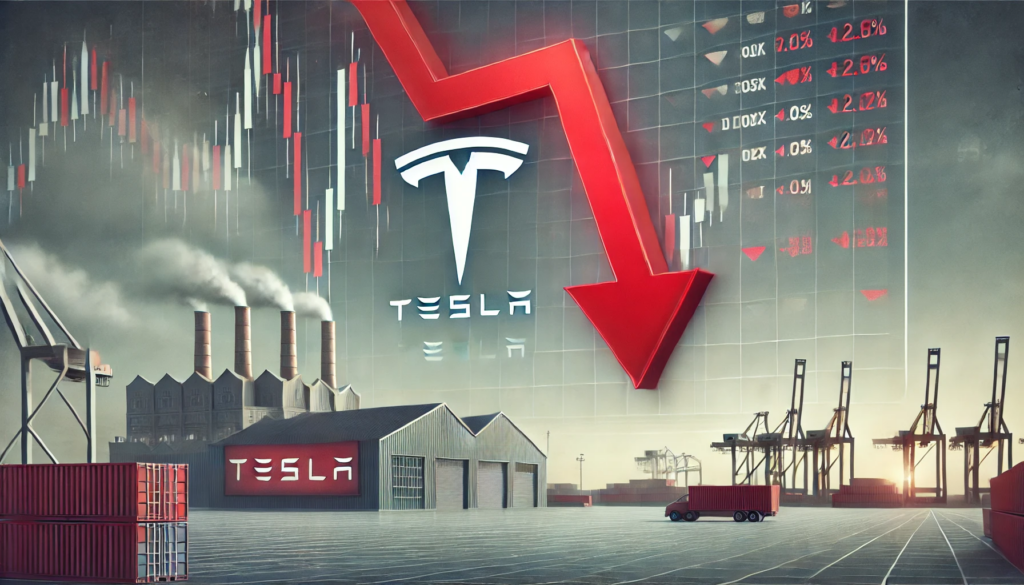
Date and Time: Thursday, April 3, 2025, 9:24 AM EDT
Editorial Log: This article was developed following a comprehensive analysis of recent developments affecting Tesla Inc. (TSLA), including the impact of newly announced tariffs and the company’s first-quarter delivery figures. Data was sourced from authoritative financial news outlets and Tesla’s official reports.
Tesla’s Stock Reacts to New Tariffs and Delivery Figures
Tesla Inc. (TSLA) is experiencing significant market fluctuations following the U.S. government’s announcement of sweeping import tariffs and the company’s release of first-quarter delivery data. These developments have raised concerns among investors and analysts about Tesla’s near-term performance and strategic direction.
Impact of New Import Tariffs
On April 3, 2025, President Donald Trump announced the implementation of broad import tariffs, including a baseline 10% tariff on all global imports, with higher rates targeting specific countries: 34% on Chinese goods, 20% on EU imports, 24% on Japanese goods, and 46% on Vietnamese imports. These measures are based on calculated trade deficits rather than traditional tariff comparisons.
The announcement led to a sharp decline in major U.S. stock indices. The Dow Jones Industrial Average dropped approximately 1,200 points (2.8%), the S&P 500 fell 3.5%, and the Nasdaq Composite decreased by 4.5%. Technology companies with extensive international supply chains, including Tesla, were among the most affected, with Tesla’s stock declining nearly 8% in early trading.
First-Quarter Delivery Shortfall
Tesla reported first-quarter deliveries of 336,681 vehicles, marking a 13% decline compared to the same period last year and representing the company’s weakest quarter since early 2022. Analysts had anticipated deliveries of around 370,000 vehicles, making this shortfall significant.
The decrease in deliveries is attributed to several factors:
- Production Adjustments: Tesla undertook changes to its Model Y production lines across all four factories, resulting in several weeks of lost production during the quarter.
- Market Challenges: The company faced intensified competition in key markets, notably from Chinese manufacturer BYD, which reported a 60% year-over-year sales increase, selling approximately 416,000 EVs and 570,000 hybrids in the same period.
- Reputational Factors: CEO Elon Musk’s political engagements have reportedly influenced Tesla’s brand perception, leading to protests and a decline in sales, particularly in European markets where a 45% drop was observed in January.
Financial Market Response
Following the release of the delivery data and the tariff announcement, Tesla’s stock experienced volatility. Initially, shares fell by up to 4% in early trading but later rebounded to close 5.3% higher. This recovery coincided with reports suggesting that Elon Musk might step back from his advisory role in the Trump administration, a move perceived positively by investors.
Analyst Perspectives
Market analysts are closely monitoring Tesla’s performance in light of these developments. Some have expressed concerns about the company’s ability to navigate the current geopolitical and economic landscape, emphasizing the need for strategic adjustments to maintain its competitive position in the EV market.
Conclusion
Tesla faces a complex set of challenges, including the immediate impact of new import tariffs, production adjustments, and reputational considerations. The company’s response to these issues will be critical in determining its trajectory in the evolving global automotive market.
Further Reading:
- Dow Jones Plunges 1,200 Points On Trump Tariffs; Apple, Nvidia, Tesla Dive
- Tesla First Quarter 2025 Production, Deliveries & Deployments
- Tesla is struggling while BYD sales are storming ahead
- Tesla stock price today: Why is TSLA facing a drop on April 2, 2025?
- Tesla Stock Tanks Amid Musk Rumors, Trump Tariffs, Dismal Delivery Data. What’s Next.
Keyword List:
- Tesla stock
- TSLA
- Tesla deliveries
- import tariffs
- Elon Musk
- electric vehicles
- BYD
